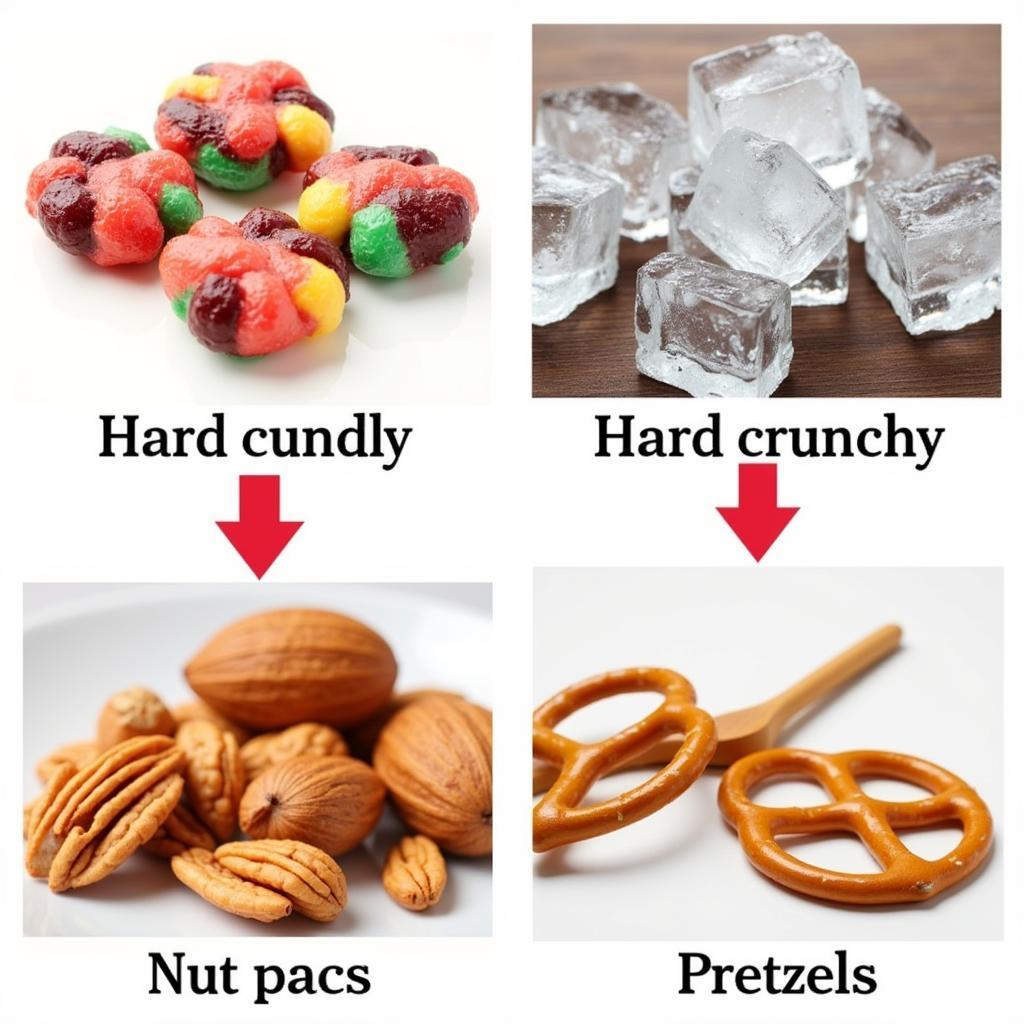TMJ, or temporomandibular joint disorder, can cause significant pain and discomfort. Managing this condition often involves a combination of professional treatments and lifestyle adjustments, including dietary changes. Knowing which Foods To Avoid Eating With Tmj can drastically improve your quality of life and reduce painful flare-ups. Let’s explore the foods that can aggravate TMJ and discuss healthier alternatives.
The Connection Between Diet and TMJ Pain
Chewing plays a crucial role in TMJ disorders. Certain foods require excessive chewing or jaw movements, which can strain the already sensitive temporomandibular joint. By avoiding these trigger foods, you can lessen the burden on your jaw and minimize pain. What are these troublesome foods? We’ll delve into specific categories and examples shortly.
Hard, Crunchy Foods: A TMJ Nightmare
Hard, crunchy foods often top the list of foods to avoid eating with TMJ. Think about biting into a hard candy or crunching on ice. These actions force your jaw to exert considerable force, potentially leading to inflammation and increased pain. Specifically, foods like hard candies, ice, nuts, and hard pretzels should be avoided.
Soft Alternatives to Crunchy Cravings
Instead of reaching for that bag of chips, consider softer alternatives that won’t aggravate your TMJ. Soft fruits like bananas or berries, yogurt, well-cooked vegetables, and even scrambled eggs can satisfy your cravings without putting undue stress on your jaw.
 Hard Crunchy Foods and TMJ
Hard Crunchy Foods and TMJ
Chewy Foods: More Trouble Than They’re Worth
Chewy foods, while seemingly less offensive than hard foods, can also exacerbate TMJ pain. Chewing gum, bagels, tough meats, and caramel require prolonged chewing, leading to muscle fatigue and potential jaw pain.
Easier-to-Chew Alternatives
If you’re craving something chewy, opt for softer, easier-to-manage options. Ground meat, cooked fish, well-cooked pasta, and soft cheeses are good alternatives that won’t strain your jaw.
Large Bites: A Recipe for TMJ Discomfort
Even if you’re eating soft foods, taking large bites can still irritate your TMJ. Cutting your food into smaller pieces and taking smaller bites can significantly reduce the strain on your jaw.
Foods High in Caffeine and Sugar: Hidden TMJ Triggers
While not directly related to chewing, foods high in caffeine and sugar can worsen TMJ symptoms by increasing muscle tension and inflammation throughout the body. Limiting your intake of these foods can contribute to overall pain reduction.
Conclusion: Making Informed Food Choices for TMJ Relief
By understanding which foods to avoid eating with TMJ and choosing healthier alternatives, you can take a proactive role in managing your condition and improving your overall well-being. Remember, managing TMJ is often a multifaceted approach, and dietary changes are a valuable component of a comprehensive treatment plan.
FAQ
- Can diet alone cure TMJ? No, diet alone is not a cure for TMJ, but it can significantly reduce symptoms.
- What are the best foods for TMJ? Soft, easily chewable foods like cooked vegetables, yogurt, and fish are generally well-tolerated.
- Are there any supplements that can help with TMJ? Some people find relief with supplements like glucosamine and chondroitin, but consult your doctor before starting any supplements.
- How long does it take to see improvement in TMJ pain after changing my diet? You may notice improvements within a few weeks, but individual results vary.
- Can stress worsen TMJ symptoms? Yes, stress can exacerbate TMJ pain, so stress management techniques are often recommended.
- What other lifestyle changes can help with TMJ? Regular exercise, good posture, and adequate sleep can all contribute to TMJ relief.
- Is it important to see a doctor for TMJ? Yes, it’s essential to consult a doctor or dentist for a proper diagnosis and treatment plan.
Need support? Contact us at Phone Number: 02437655121, Email: minacones@gmail.com Or visit us at: 3PGH+8R9, ĐT70A, thôn Trung, Bắc Từ Liêm, Hà Nội, Việt Nam. We have a 24/7 customer service team.